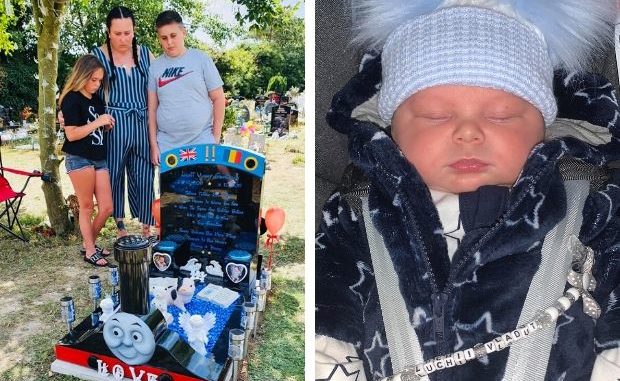
Parents devastated by the death of their five week old son last December after a catalogue of hospital failures have had to face yet more trauma after discovering the tragedy could have been prevented if action to diagnose and treat his father for tuberculosis (TB) had been taken almost two years before.
The failure to act on ‘shadows’ evident in a chest X Ray taken at William Harvey Hospital in 2018 for Vlado Gavrilescu led to a catastrophic chain of events with the death of baby Luchii in December 2019, permanent lung damage and ongoing treatment for Vlado and a wide ranging trace and test for possibly hundreds of people who could have contracted the bacteria, which is being co-ordinated by Public Health England.
Those being contacted and screened range from family – all of whom contracted the condition and are undergoing treatment – friends, everyone in QEQM maternity when Lucchii was born, all those in children’s emergency and Rainbow Ward when he was admitted, those at WHH when Vlado attended and now a further extension to all attendees at Luchii’s funeral and wake.
Luchii’s mum, Laura Cooke, says she is aware of around 20 positive tests, including two babies, so far.
Laura and Vlado with Luchii
The huge trace operation and the knowledge that Luchii could still be alive if Vlado had been treated straight away – and so avoiding transmission of the condition to his son – is just another in a list of ‘multiple failures’ the family from Margate say they have endured.
The 29-year-old, who is also mum to Archie 11 and Macie 10, said: “If Vlado’s TB had been identified in 2018 – well, it was identified but the senior doctor wrote all was fine – he could have been treated as it is so curable. We would still have Luchii and so many other people would not be affected.
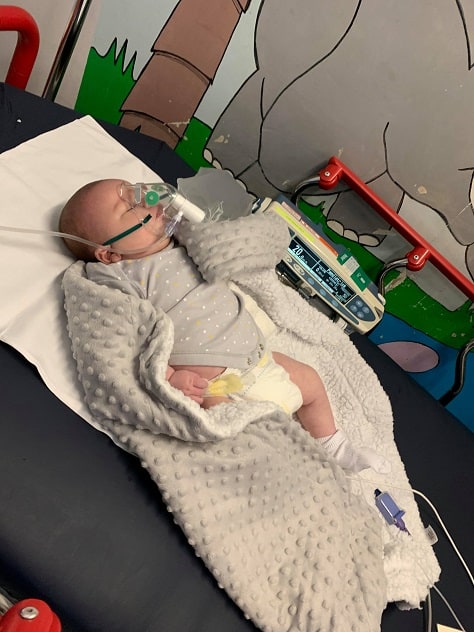
“But it was not identified until the day after Luchii’s funeral (January 2020). I went with Vlado for a CT scan in Canterbury because he was so unwell, losing weight and coughing. We were told he had to go to accident and emergency immediately so we drove to Ashford and they took us in straight away.
“Everyone was rushing around taking blood and an X Ray and a sputum, which later came back as confirmed TB.
“Vlado stayed in hospital for two weeks and was very poorly and weak. The consultant could not believe Vlado was still here after two years. The extensive damage to his lungs will be there forever and he is still ill. Taking 12 tablets a day and weak and tired all the time.
“It is such a massive thing, affecting not just us and Luchii but possibly hundreds of people.”
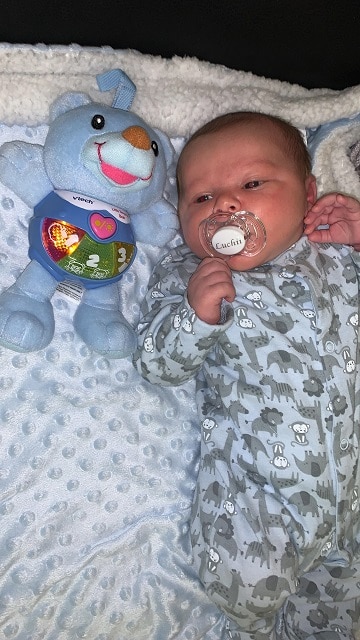
Baby Luchii was sent home from QEQM with a diagnosis of bronchiolitis on November 29 and again on December 3, 2019, after Laura took him in with breathing problems, a cough, feeding difficulties and a blotchy rash. The second visit had been requested by a locum GP who was worried about his condition.
An investigation report by the Trust later admitted blood tests, a sepsis screen and a senior review should have been done at this point, it also highlighted a lack of documentation by staff, missed observations checks, limited advice given to Laura and a failure to take Luchii’s young age into consideration alongside his symptoms.
On December 6 at around 11.15am Laura called 999 after discovering Luchii was not breathing properly. A First Responder downgraded the call to a 3 -urgent – after Luchii ‘woke up’ while they were in attendance. This meant the family waited an hour until a Red Cross ambulance arrived to take them to QEQM’s emergency department.
At 1.30pm the paediatric sister noticed that Luchii was pale and dusky and his condition was escalated to the paediatric house officer who recognised sepsis and immediately alerted the Registrar on call.
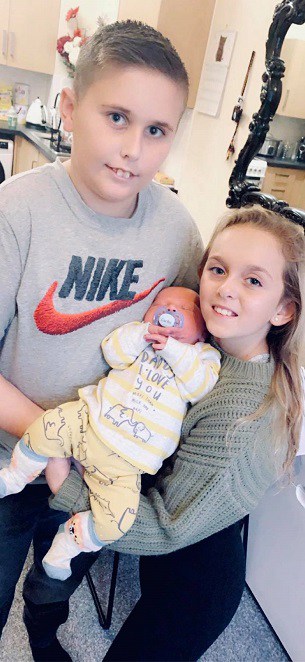
But a consultant was not called in straight away and, the Trust report says, at this point Luchii should have been moved to Resus and cardiac monitoring should have been started. A transfer to a London hospital should also have been arranged but by the time this was done it was too late.
Instead, it was some six hours before Luchii was moved to Rainbow Ward once a bed finally became free and staff there were unaware of how very ill he was until he arrived.
Shortly after he went into cardiac arrest.
Laura said: “No-one (consultants) was aware he was even there but once he got to Rainbow Ward the consultant looked at him and said ‘this child needs help.’
“Then it was like something out of a movie. Luchii stopped breathing and the porters were shouting ‘stay back’ and he was rushed to theatre. I never saw him alive again and the last thing he would have heard was people shouting and panicking. It was horrendous.
“They said he was stable in theatre but we were never invited in to see him and after he passed away the staff had a meeting before telling us. We were told we couldn’t go in and see and touch him but we went in anyway.
“Everyone just disappeared. We had been in the recovery room with two chairs for seven of us, no light, so all sat in the pitch dark while doctors and nurses were running everywhere, opening cabinets, looking for things, running around with massive injections. One lady ran over to the other side of the hospital but by the time she got back it was too late.
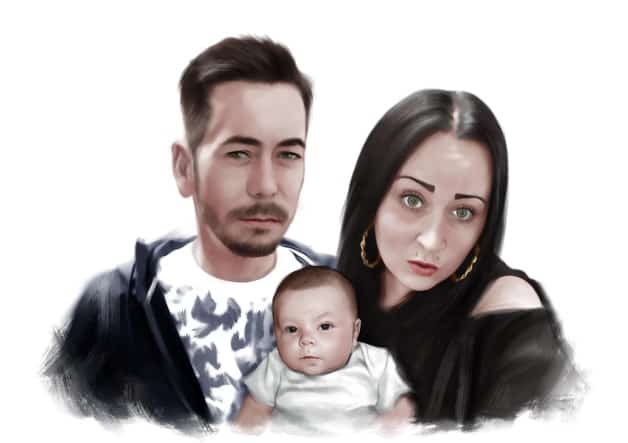
“It is a living nightmare that we relive every day. We haven’t been offered counselling.
“We are so very angry and to say totally devastated is an understatement, at the loss of baby Luchii. The Trust has a lot to answer for and words are never enough. They have ruined our family for life and we are so disgusted with all the failings they have made, it’s so very shocking. Not only did they fail us once but then twice and on multiple occasions.”
Initially the family were told Luchii’s cause of death was sepsis but a post mortem confirmed that Luchii had disseminated tuberculosis (TB) with a lymphocytic myocarditis. This means that the TB infection had spread from Luchii’s lungs to other parts of his body. This is an extremely rare, but treatable, condition.
A report by the Trust following the tragedy says: “If the father’s TB had been detected and treated earlier, following the chest X-ray in 2018, Luchii’s death and transmission of infection to others could have been prevented.”
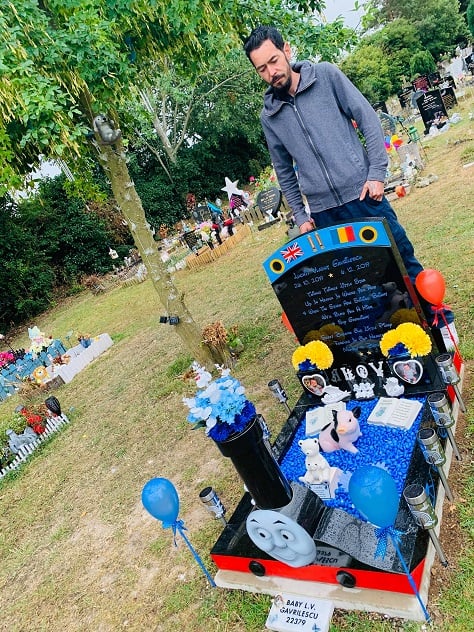
Laura says the family wants ‘dramatic’ change within the Trust and a public apology from everyone involved.
Some changes have already taken place, including all chest X-rays requested by emergency departments now being formally reported by radiology and ensuring crash trolleys are fully stocked.
In all the Root Cause Analysis Investigation Report by the Trust into Luchii’s death makes 17 recommendations for change. A RCA report for Vlado, 30, makes a further four recommendations.
Laura said: “I want things to be changed dramatically and I want a public apology from everyone involved in Vlado and Luchii’s care,
“But nothing will ever bring Luchii back.”
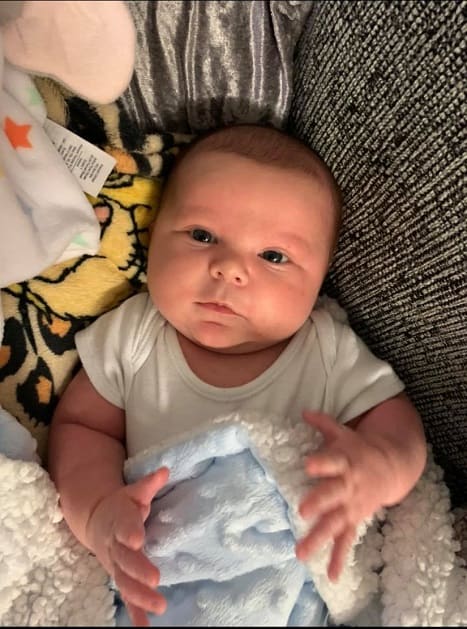
A spokesman for East Kent Hospitals said: “We are continuing to support Luchii’s family after his death and are truly sorry that mistakes were made in his care. We would like to reiterate our heartfelt condolences to them on their devastating loss.
“We have shared with the family the findings of an initial investigation into his death, and also into the circumstances surrounding his father’s diagnosis of TB.
“As part of the normal process after someone is diagnosed with TB, we followed Public Health England guidance to trace and treat people he had been in contact with, and a cluster of cases was identified.”
A complaint regarding South East Coast Ambulance Service is also being made by the family to the health ombudsman. The service has previously expressed its condolences
Dr Rachel Pudney, Health Protection Consultant for Public Health England South East, said: “I would like to express my sincere condolences to the friends and family of the child who has sadly died. We are working closely with the local specialist TB services and the hospital trust to identify and where necessary screen any close contacts related to this particular case.
“Those who are identified as close contacts are being made aware of the situation, and given advice on the signs and symptoms of TB along with the action they should take if they feel unwell with similar symptoms, as a precaution.”
The family will be meeting with Trust chief executive Susan Acott and Chief Medical Officer Dr Rebecca Martin next month.
An inquest date for Luchii’s death is yet to be set as the coroner needs to receive reports from the Trust revised RCA reports.
What is TB
Tuberculosis (TB) is a bacterial infection spread through inhaling tiny droplets from the coughs or sneezes of an infected person. It mainly affects the lungs, but it can affect any part of the body, including the abdomen, glands, bones and nervous system. TB is a potentially serious condition, but it can be cured if it is treated with the correct antibiotics.
TB that affects the lungs (pulmonary TB) is the most contagious type, but usually only spreads after prolonged exposure to someone with the illness.
In most healthy people, the body’s immune system kills the bacteria and there are no symptoms. Sometimes the immune system cannot kill the bacteria, but manages to prevent it spreading in the body. Sometimes there will not be any symptoms but the bacteria will remain in the body. This is known as latent TB.
People with latent TB are not infectious to others. If the immune system fails to kill or contain the infection, it can spread within the lungs or other parts of the body and symptoms will develop within a few weeks or months. This is known as active TB. Latent TB could develop into an active TB disease at a later date, particularly if the immune system becomes weakened.
With treatment, TB can almost always be cured. A course of antibiotics will usually need to be taken for six months. A patient with a diagnosis of pulmonary TB, can be contagious for about two to three weeks into a course of treatment. They will not usually need to be isolated during this time, but it is important to take some basic precautions to stop the infection spreading to family and friends.



